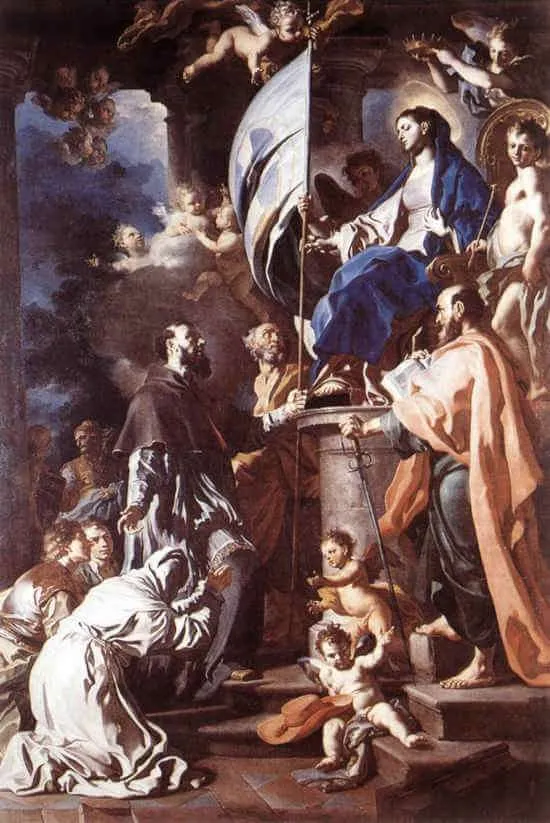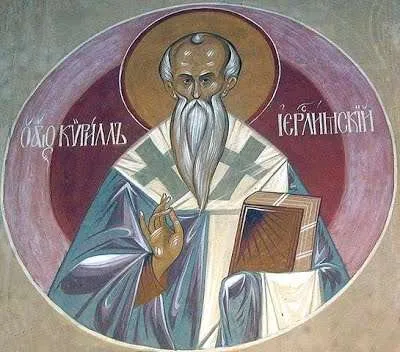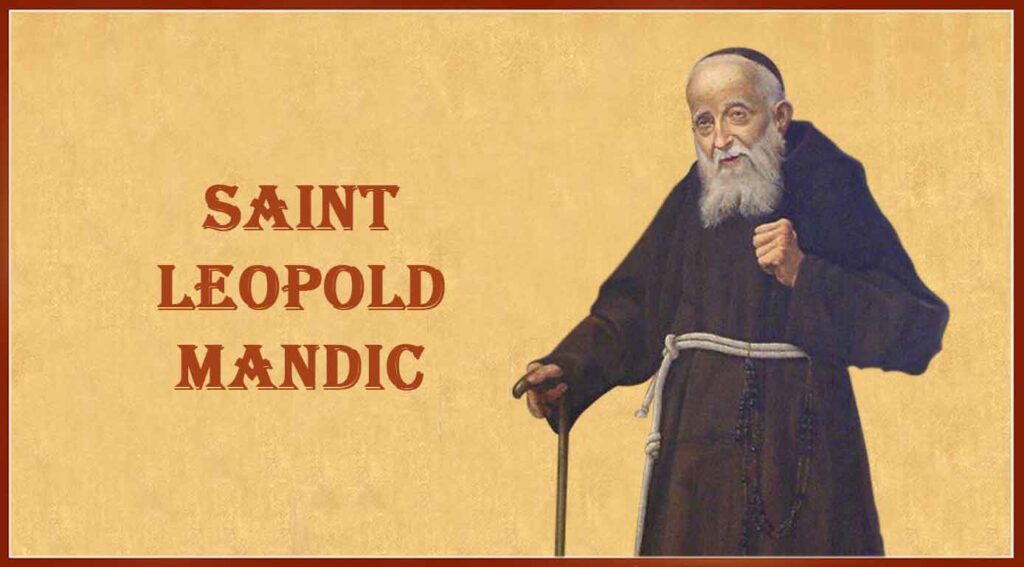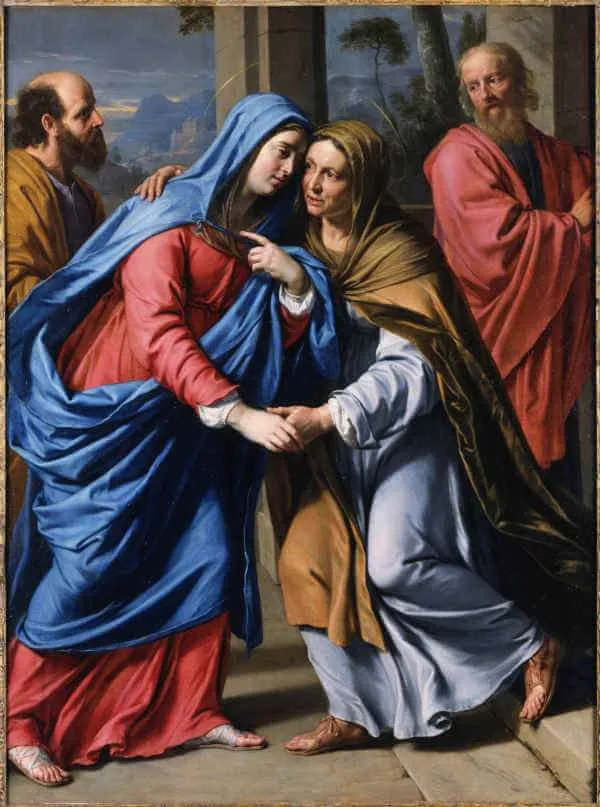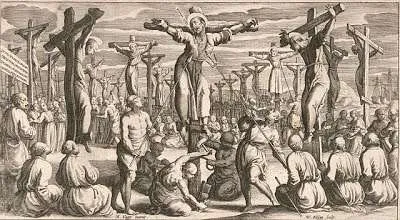c. 1217–1274; Invoked against intestinal problems; Canonized by Pope Sixtus IV on April 14, 1482; Proclaimed the Seraphic Doctor of the Church by Pope Sixtus V in 1588
Saint Bonaventure was born sometime during the last decade of Francis of Assisi’s life and would be closely tied to the saint and his Franciscan order for all of his own life. Born in Civita di Bagnoregio, present-day Italy, the baby was baptized Giovanni di Fidanza, after his father. The region was then part of the Papal States, located about seventy miles north of Rome and fifty miles southwest of Assisi. At the time of Giovanni’s birth, the Franciscan order had expanded to include around 5,000 members in less than a decade.
As a child, Giovanni was miraculously healed by Saint Francis of Assisi and may have acquired the name Bonaventure as a result. According to one legend, when Francis cured Giovanni, the future saint exclaimed, “O buona ventura!” which translates to, “O good fortune!” Some biographies suggest that the cure may have occurred after Francis’ death through the intercession of Giovanni’s mother. Regardless, Saint Bonaventure later recounted the miracle, stating, “For I, who remember as though it happened but yesterday how I was snatched from the jaws of death, while yet a child, by his invocation and merits, should fear to be convicted of the sin of ingratitude did I refrain from publishing his praises.” Little else is known about Giovanni’s childhood.
As a young man, Giovanni traveled to Paris for his studies and joined the Franciscans in 1243, formally adopting the name Bonaventure. He stayed in Paris and embarked on a rigorous study regimen, with a special focus on the Sacred Scriptures and the Sentences of Bishop Peter Lombard. His doctoral thesis was titled Questions on the Knowledge of Christ. During his time in Paris, a theological battle was brewing between traditional academics and the new Franciscan and Dominican mendicant orders. Unlike previous orders that lived in large monasteries and sustained themselves by owning large tracts of land, these two new orders were traveling preachers living out the vow of poverty. Their novel approach to religious life, combined with their rapid growth, incited envy and suspicion within traditional academic circles. Father Bonaventure, a Franciscan, was at the forefront of this battle through his writings, in which he clarified the theological and Scriptural basis of the mendicant charism. After about fourteen years in Paris, Father Bonaventure was recognized as a Doctor and Master of Theology at the University of Paris. His Dominican counterpart, Father Thomas Aquinas, also received his doctorate degree on the same day, October 23, 1257.
The still-new Franciscan and Dominican orders were growing rapidly, necessitating solid guidance. Francis had always been reluctant to let his friars advance to further studies, as he was aware of the pitfalls academic pride could pose. Before his death in 1226, Francis appointed future-saint Anthony of Padua in charge of academics for the Franciscans. For the next twenty-five years, the Franciscans were trying to define their identity in the Church and to determine the future direction of the order. Should they remain simple, poor, and uneducated mendicant preachers? Or should some of them become university professors and leaders within the Church? God chose Father Bonaventure to help the Franciscans navigate these questions.
Within a year of Bonaventure’s receiving his doctorate in 1257, the Franciscans held a General Chapter, during which they elected him as the order’s Minister General. Father Bonaventure served in this leading role for the next seventeen years. It was truly an extraordinary time for the Franciscans. Forty years after Bonaventure’s birth, the Franciscans had grown from 5,000 friars to 30,000 and had spread across Europe, North Africa, the Middle East, and even China. Father Bonaventure had a monumental task ahead.
One of Father Bonaventure’s initial goals was to unify the Franciscans. There were many different views of their founder, numerous written legends, various interpretations of his charism, and a split within the order seemed likely. Father Bonaventure addressed this by gathering and unifying all the norms that governed the daily life of the friars. He then collected all the biographies of Saint Francis and wrote his own definitive biography based on the accounts of firsthand witnesses and the most reliable sources. In 1263, at a General Chapter in Pisa, Father Bonaventure’s biography was adopted by the order as the sole and authentic biography.
In 1265, the pope appointed Father Bonaventure as the Archbishop of York. Bonaventure resisted, believing this not to be his calling. Before Bonaventure was even ordained, the pope allowed him to resign to continue his work as Minister General of the Franciscans.
Over the next nine years, Father Bonaventure continued to guide the Franciscans through their growing pains. He also wrote numerous letters, sermons, commentaries, and profound spiritual and mystical theological works. His theology was always very Christ-centered, just as Saint Francis had been fully Christ-centered. He understood and articulated the charism of their founder in a rich and theological way that remained faithful to the simple wisdom of Saint Francis. Saint Francis had always been concerned with the pitfalls that some experienced when they engaged in advanced theological studies. His concern was that for some, study did not lead to Christ; instead, it led just to intellectual theologizing. Father Bonaventure was aware of this concern and worked to ensure that his deep theological articulations fostered personal faith and love of God, rather than just intellectual knowledge. He was also deeply devoted to the Mother of God. His profound and mystical writings would later result in Pope Sixtus V naming him the Seraphic Doctor of the Church.
Father Bonaventure had gained such a reputation that popes regularly sought his counsel. In 1274, Pope Gregory X ordained him a bishop and appointed him as a cardinal. He then tasked him with guiding the significant Second Council of Lyon, which aimed at restoring the unity of the Eastern and Western Churches. Before the council concluded, for unknown reasons, Cardinal Bonaventure passed away at the age of fifty-six.
Saint Bonaventure was, in many ways, the new face of the new Franciscan order. God inspired the order through Saint Francis and shortly after, He directed the zeal of its members through Saint Bonaventure’s profound mystical wisdom.
As we honor this great saint, ponder, especially, his intellectual approach to the faith. He was brilliant, but he always used that brilliance to point others to an authentic conversion of heart. He didn’t engage in theology for the sake of theology; he did it for the love of Christ, in imitation of the charism of Saint Francis. Ponder your own knowledge of Christ and pray to this Seraphic Doctor, asking him to intercede for you so that your knowledge of Christ will lead you and others to a deeper love of Christ Himself.
Source: https://mycatholic.life/saints/saints-of-the-liturgical-year/july-15—saint-bonaventure-bishop-and-doctor/


